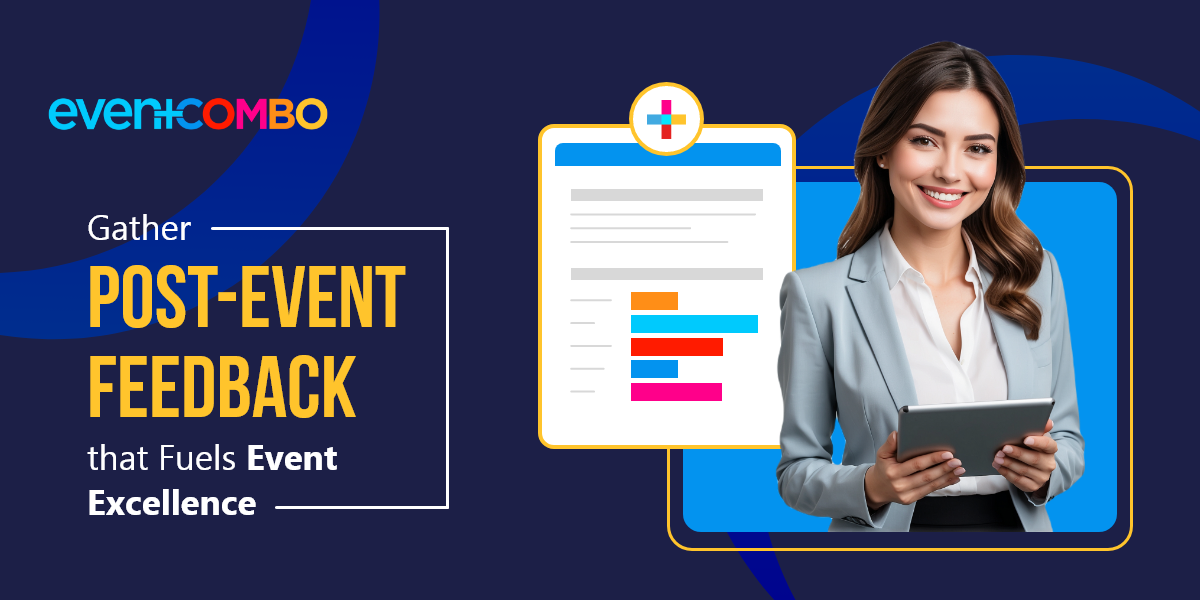

Engaging in post-event activities is crucial for consistently delivering top-notch experiences. Post-event survey questions give you the insights you need to create personalized experiences and win your audience’s trust.
Think of them like a recipe card after a lavish dinner party. After guests leave, you may want to know how they felt about the items you prepared. On the recipe card, guests can jot down their feedback and, by analyzing it, you will find what appealed to their taste buds and what didn’t.
Similarly, when you analyze the suggestions and feedback from post-event survey questions, you gain valuable insights to plan standout experiences with clarity.
In this blog, we’ll explain all about the post-event survey questions, their types, and how to use the insights derived through responses to boost your event success.
A post-event survey questionnaire is a set of questions curated for attendees, sponsors, and speakers to gauge the effectiveness of the event. It is part of the post-event engagement strategy to gain feedback about any aspect of the event, such as registration, check-in, navigation, networking, sessions, content, food, and venue.
You can tailor post-event survey questions to understand closely what went well and what didn’t. They are useful to learn about the professional background, demographics, reasons for attending the event, how guests felt during the event, and more. The responses empower you to refine the aspects of the event that did not match the expectations of attendees. Acting on this feedback guarantees an improvement in your future experiences.
To understand the effectiveness of your planning process, it is crucial to gather attendees’ perspectives about the event. You don’t want to repeat what went wrong or what was not liked by the majority. Post-event surveys allow you to make changes in the way you orchestrate events and enhance their quality. As a result of the improved quality, attendees, sponsors, and volunteers feel seen, heard, and valued leading to:
Post-event survey questions come in all shapes and sizes, but if you want the best results, you’ve got to focus on the most impactful ones. We’ve boiled it down to the top five formats that deliver. Let’s dive into each—with examples to guide you along the way!

Also, known as rating scale questions, this type of survey questions are ideal to assess what the attendees felt about a particular event. You can use a rating option, such as stars, points, smiley faces, or qualities like excellent, neutral, terrible, and more. These questions help gauge the kind of experience guests had with a specific session, venue navigation or networking. Here are some examples:
1. How would you rate the experience you had at our event?
2. Were you able to navigate the event easily?
3. Did the networking opportunities meet your expectations?
4. How well-organized was the event overall?
5. Were you satisfied with the discussion time at the conference?

One of the best types of post-event survey questions for attendees is open-ended questions. This format offers much freedom to the attendees to share their views and be vocal about something they particularly liked or disliked. You can use the following open-ended question examples when creating your survey.

Close-ended questions are easy and quick to answer. They take only a few seconds and provide valuable post-event insights. More surveys get completed with this type of questions. It helps you implement the feedback received quickly and make reforms improvements. Some options include the following:
1. How satisfied were you with the event’s speakers or presenters?
2. Did you attend any educational workshops at the exhibition?
3. Did the topics in the webinar meet your expectations?
4. How satisfied were you with the event’s opportunities for audience participation?
5. Will you consider speaking at our next event?
6. How engaging were the event’s keynote speakers or presenters?
7. Were the event’s breakout sessions or workshops effective?

MCQ-type post-event follow-up questions are best when you want to know the opinions of attendees regarding a preset group of options. You can create MCQ questions for a variety of event aspects and tailor your experiences accordingly. The following examples will help you.
1. What is your highest level of education?
2. Which part of the event was most interesting?
3. Who was the best speaker?
4. How helpful was the event app in navigating the event and connecting with others?
5. What could have been better in the event?

A Linkert scale is a quantitative analysis data collection tool to learn about the sentiments of respondents. Post-event survey Linkert scale questions are similar to rating scale but they reveal the general feeling of respondents more precisely. Linkert scale questions exclusively focus on a set of answers on a spectrum, while a rating scale has any number of rating options. The following post-event follow-up questions will make the Linkert scale type clearer.
The results of the post-event survey can be used to identify the experience's, strengths and shortcomings. Different types of questions help you spot the aspects that impressed guests and sponsors, those that could be made better, and things that were not up to the mark at all. Use the responses of different questions to analyze the experience as follows:
Gain a nuanced understanding of individual respondents through the answers to open-ended questions. You can identify things like better speaker recommendations, the exact target audience interested in your services, or the best format of event. The qualitative data from open-ended questions lets you get to the bottom of the trends.
For a quick and effortless post event analysis, close-ended questions are the best. For example, if you implemented a new activity or game to increase engagement, you could find exactly how guests felt about it through a yes or no type of answer. Close-ended questions let you easily compare data points and offer a precise way to interpret opinions.
Also, such post-survey questions attract a high response rate. Given that the average response rate for email surveys is around 24.8%, close-ended questions are highly effective in eliciting the desired responses.
Rating and Likert scale questions are best used to analyze the thinking of your attendees or sponsors toward different aspects of the event. You can interpret the experience of the respondents easily with such questions. Use them to measure the deep and unbiased views and feelings of guests regarding the experiences and opportunities your event delivered.
Using multiple-choice questions is akin to giving each player a checklist with specific options. The answers to these post-event survey questions should be used to explore the demographics of your target audience, select the right marketing channels, and pinpoint specific strengths and weaknesses. You can do away with an arrangement or improve it slightly based on the feedback gained from MCQ questions.
Designing a post-event survey and distributing it is effortless with event technology. Our all-in-one event management platform provides you with unlimited survey templates, which can be used to create a visually appealing questionnaire. After that, you can schedule it for distribution and get feedback in your email.
Before writing questions, understand the nature of your audience. This will help you ask the most relevant questions. So, if your audience loves to share opinions, use more open-ended questions. But if they comprise mostly busy working professionals, use close-ended and rating scale-type questions.
You can also offer incentives, like a discount or gift card to prompt people to participate. Our event management solution will make your planning process easier so you can focus more on making the experience truly special. Schedule a free demo here.

Every event organizer knows the sinking feeling of watching a well-planned budget unravel. That initial estimate of $400,000 suddenly balloons to $540,000 due to unexpected fees and overlooked expenses.

Eventbrite is a common name in the event management space, but if you’re here, chances are it isn’t checking all your boxes. Like many professionals, you may be looking for Eventbrite alternatives or exploring...

Networking events remain the backbone of professional growth, whether you're building a business, recruiting talent, generating leads, or seeking strategic partnerships.